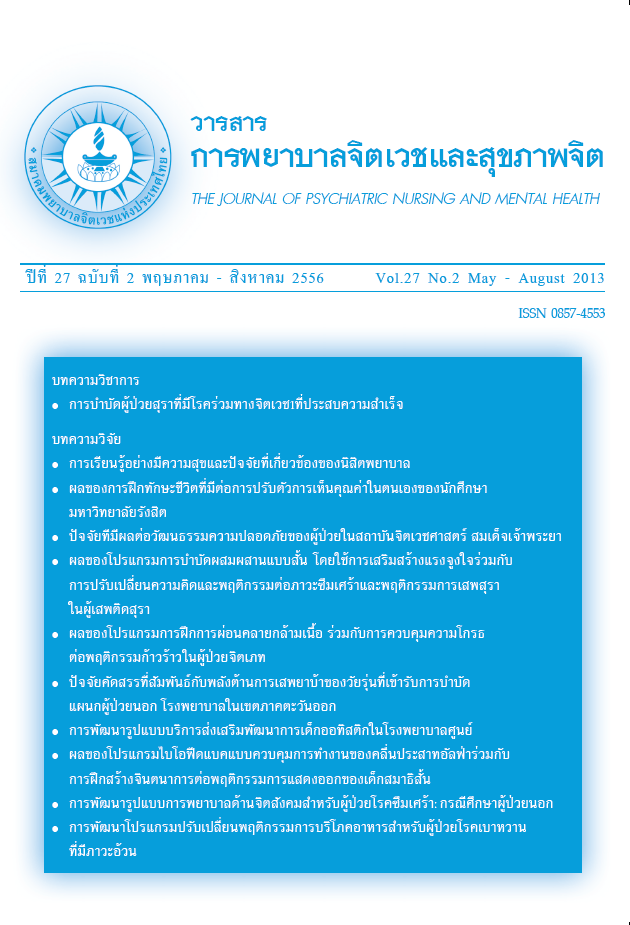ผลของการฝึกทักษะชีวิตที่มีต่อการปรับตัวและการเห็นคุณค่าในตนเองของนักศึกษามหาวิทยาลัยรังสิต
Main Article Content
บทคัดย่อ
บทคัดย่อ การพ้นสภาพและการลาออกของนักศึกษาสะท้อนให้เห็นปัญหาที่สำคัญ คือ การไม่สามารถปรับตัวและการไม่เห็นคุณค่าในตนเอง ซึ่งควรได้รับการป้องกันและจัดการแก้ไข เพราะมีผลกระทบต่อเศรษฐกิจส่วนบุคคลและสุขภาพจิตของนักศึกษาเป็นอย่างมาก การวิจัยครั้งนี้ เป็นการวิจัยกึ่งทดลองแบบทดสอบก่อน-หลังและมีกลุ่มควบคุม วัตถุประสงค์ของการวิจัย (1) เพื่อศึกษาเปรียบเทียบผลของการฝึกทักษะชีวิตที่มีต่อการปรับตัวและการเห็นคุณค่าในตนเองของนักศึกษาระหว่างก่อนทดลองและหลังทดลอง (2) เพื่อศึกษาเปรียบเทียบผลของการฝึกทักษะชีวิตที่มีต่อการปรับตัวและการเห็นคุณค่าในตนเองของนักศึกษาระหว่างกลุ่มทดลองและกลุ่มควบคุม (3) เพื่อประเมินความคิดเห็นของนักศึกษาถึงการเปลี่ยนแปลงพฤติกรรมภายหลังเข้ารับการฝึกทักษะชีวิต กลุ่มตัวอย่างเป็นนักศึกษาระดับปริญญาตรี ชั้นปีที่ 2 จำนวน 24 คน ที่กำลังศึกษาอยู่ในมหาวิทยาลัยรังสิต กลุ่มตัวอย่างได้รับการสุ่มเข้ากลุ่มทดลอง และกลุ่มควบคุม กลุ่มละ 12 คน กลุ่มทดลองได้รับการฝึกทักษะชีวิตเป็นเวลาต่อเนื่องกัน 4 สัปดาห์ สัปดาห์ละ 3 ครั้ง ใช้เวลาครั้งละ 1 ชั่วโมง จำนวน 10 ครั้ง เครื่องมือในการรวบรวมข้อมูล ได้แก่ แบบสอบถามการปรับตัว และแบบทดสอบการเห็นคุณค่าในตนเอง วิเคราะห์ข้อมูลด้วยสถิติเชิงพรรณนาและสถิติทดสอบทีผลการวิจัย พบว่า (1) นักศึกษาที่เข้ารับการฝึกทักษะชีวิต มีการปรับตัวดีกว่าก่อนเข้ารับการฝึกทักษะชีวิต อย่างมีนัยสำคัญทางสถิติที่ระดับ .05 (2) นักศึกษาที่เข้ารับการฝึกทักษะชีวิต มีการปรับตัวดีกว่านักศึกษาที่ไม่ได้เข้ารับการฝึกทักษะชีวิต อย่างมีนัยสำคัญทางสถิติที่ระดับ .05 (3) นักศึกษาที่เข้ารับการฝึกทักษะชีวิต มีการเห็นคุณค่าในตนเองดีกว่าก่อนเข้ารับการฝึกทักษะชีวิต อย่างมีนัยสำคัญทางสถิติที่ระดับ .05 และ (4) นักศึกษาที่เข้ารับการฝึกทักษะชีวิต มีการเห็นคุณค่าในตนเองดีกว่านักศึกษาที่ไม่ได้เข้ารับการฝึกทักษะชีวิต อย่างมีนัยสำคัญทางสถิติที่ระดับ .05Abstract Termination and students’ resignation indicated that problems which they could not adjust themselves and depreciate their own value. This problem should be prevented and solved since it extremely had affected their expenditure as well as mental health. This quasi-experimental pre-posttest with control group design was used. The purposes of the study were: (1) to examine the effects of life skills training on the adjustment and self-esteem of the students both prior to and after the life skills training, (2) to validate the effects of life skills training on the adjustment and self-esteem of the students between an experimental group and a control group, and (3) to evaluate the students’ opinions about behaviors’ changes after participating life skills training. A sample of 24 subjects, the second year students, were randomly assigned into an experimental group and a control group, equally. The experimental group continuously received 1 hour-10 sessions life skills training for four weeks, three times a week. The instruments of data collection were the questionnaires of adjustments and self-care scale. Data were analyzed by descriptive statistics and t-test. Results were: (1) the students who participated in the life skills training had statistically significant adjustment better than those before (p < .05), (2) the students who participated in the life skills training had statistically significant adjustment better than the students who did not participate in the life skills training (p < .05), (3) the students who participated in the life skills training hadstatistically significant self-esteem better than those before (p < .05), and (4) the students who participated in the life skills training had statistically significant self-esteem better than the students who did not participate in the life skills training (p < .05).
Article Details
ประเภทบทความ
บทความวิจัย
บทความที่ได้รับการตีพิมพ์แล้ว เป็นลิขสิทธิ์ของสมาคมพยาบาลจิตเวชแห่งประเทศไทย


